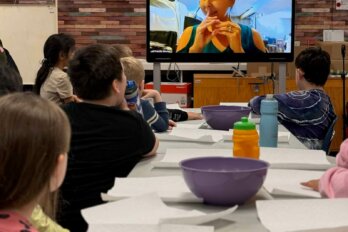There’s always been a certain optimism associated with youth, but in 2021 even the young can’t deny that things look bleak. Raised in the urgency and immediacy of the social media age, today’s teens have never been afforded the opportunity to blissfully ignore seismic world issues—pandemics, repeated financial crises, and climate disasters, both near and far. But maybe—in the case of aspiring authors, at least—that’s a good thing.
Each in their own way, this year’s nominees in the Amazon First Novel Award’s Youth Short Story category leverage creativity as activism, remaining attuned to some very real social ills while expressing the full spectrum of attendant grief and hope, in their own unique voice. Offering a moment of escapism, we asked them: what is your favourite future to imagine?
“Part of my writing is about [imagining] a future where people are loved and respected no matter how they are—where my children can grow up and express themselves however they want and without any judgment. The short story that I wrote for this competition was about my experience of getting raped over a year ago. I felt like that was my way of showing my authenticity, to bring it to the surface, and making it less of a thing that no one talks about.”
—Stella Braun
“My favorite future to imagine is one where I thrive, one where I’m able to do what I want and be who I want, and there’s no one stopping me. It’s a place where I’m allowed to write and to escape into crazy imaginary worlds, and share my ideas with the people around me. It’s a world where my efforts are appreciated—so one in which I’ve published a book. Of course, the happiness and health of others is important, but I’m the only constant in my life. People and opportunities come and go, but at the end of the day, I’m still going to be with me.
What I like to do most is create. And, let’s be honest, I’m not at my best yet. I’m still improving. But the end goal is that I can write characters that are kind, forgiving, and relatable—characters that people from anywhere can look at and say, ‘Hey, they’re just like me!’”
—Aimee Despres-Smyth
“They say the future we imagine is the future we get, but is that true? There are so many things I wish to change in the world, but the main one is to make refugee children happy, give them hope, and [provide them with] a chance to start again, all of which is achievable by providing them with education. I was one of them once. My friends in refugee camps right now are these children. I always tell them not to give up, but I always wonder if that’s even fair, when I’m living in a wonderful house and surrounded by so many opportunities. I have decided to work hard to be successful to support them, and I’ll keep telling the world about them so they won’t be forgotten.”
—Rama Altaleb
Read “Lost Childhood” by Rama Altaleb, the winning youth short story of the 2021 Amazon Canada First Novel Awards.
“Pop culture, politics, and the environment influence my work a lot now. I write about teens and LGBT matters and mental health. Teens go through a lot of stress because of climate change, for example, and dealing with that being put on our shoulders, or politics being harmful for LGBT teens. I put a lot of those elements into what I write. I love creating characters who others can relate to, not only as an outlet for myself, but with the goal of helping others. If one day we weren’t in as much distress, I wouldn’t necessarily have to write about that all the time anymore. But for the time being I’m going to continue doing that.”
—Malcolm Wernestrom
“I want to see a world where girls my age are not afraid to be leaders. I really like going out there and challenging myself, and I notice that a lot of girls my age don’t exactly think the same way. I want to shed light on that, so I want to inspire feminism with my future work. I’ve noticed that there aren’t many strong female lead characters in literature and cinema, so I want to do more about that.
I take inspiration from my mom; she’s a really strong woman. I started a campaign to send girls to school with a couple friends. We watched a couple of presentations about how hard it is for women around the world, especially when it comes to education. I thought, you know, that should be a baseline in a society.”
—Diya Singh
“To be honest, I don’t have an answer to the question. Besides the financial wealth I constantly [imagine] but do nothing about, there are not many concrete details I can think of. Vision, productivity, and discipline are concepts I have not yet mastered. I simply write because I like to. Sure, my writing will reflect certain aspects of my life, but I’m not so grown up as to know what kinds of stories I can tell, or who I will tell them as. I’ll just keep chugging along and find out.”
—Yanxi Li



